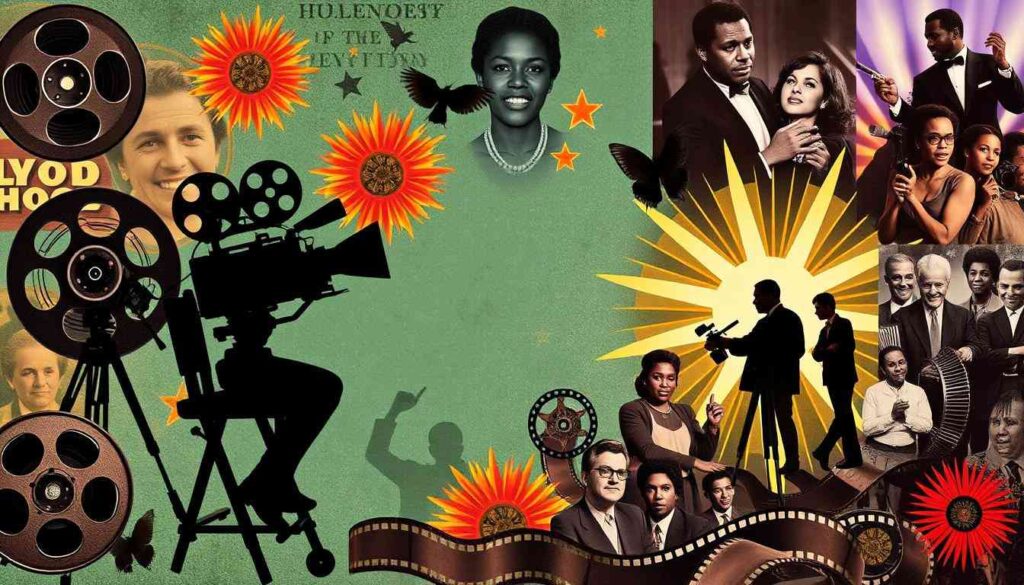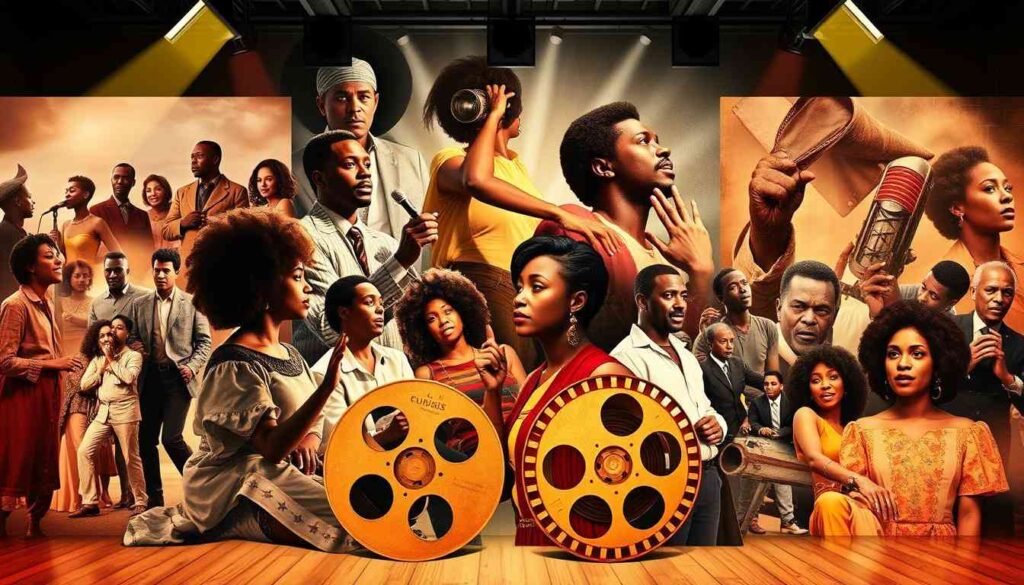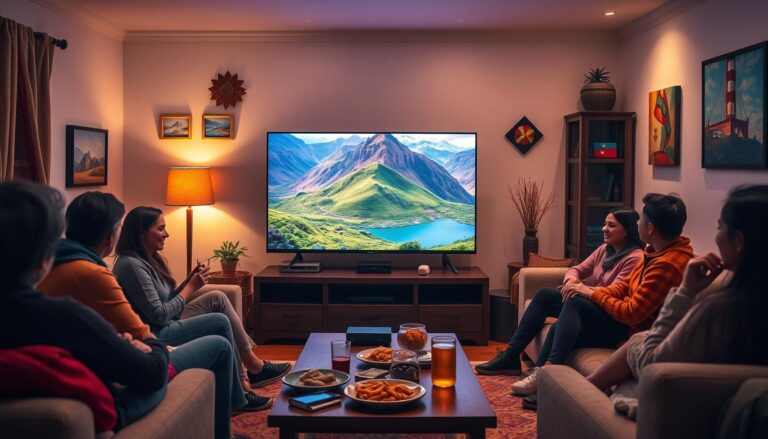
Intro
Allintitle:Afro American Movies are a rich and diverse world, often overlooked by many. But the world of Black movies has grown a lot. It now offers many films that help us better understand the African American experience.
From the early works of key directors to today’s stories about justice and being seen, we’ll look at key Afro-American films. These films have made a big impact on the movie world.
The story of Afro-American Movies is one of strength, creativity, and wanting to be heard. As we explore this world, get ready for stories that break down old ideas, celebrate culture, and push for change. This guide is for both movie lovers and newcomers to Black cinema. It’s a way to discover the amazing and varied world of Afro-American films.
What is the Evolution of African American Cinema?
African American cinema has a rich history, starting in the early 20th century. Pioneering Black filmmakers made a big impact, changing the industry. They showed the African American experience and challenged old norms.
The Birth of Black Cinema
Oscar Micheaux was a key figure in African American cinema. He made over 40 films during the silent era. His films, like “Within Our Gates” in 1920, showed racism and social injustice in a real way.
Pioneering Directors and Their Impact
Later, new African American filmmakers came along. Spike Lee and John Singleton made big waves. Their films, like “She’s Gotta Have It” and “Boyz n the Hood,” showed the tough side of urban life and racial identity.
Cultural Significance Through Decades
African American cinema has shown the strength and creativity of Black filmmakers. From the early days to today, these films have entertained and made important points. They celebrate African American identity and culture.
Historical Significance and Cultural Impact of Black Films
Black cinema has been key in keeping cultural heritage alive. It has explored historical stories and challenged old views. Films like “Chronicle of the Years of Fire” (1975) and “Yeelen” (1987) have made a big impact.
These films have given a voice to marginalized communities. They keep cultural traditions alive and tell stories of struggle and identity. Through their stories, Black filmmakers have changed how we see the world.
Black films have changed society’s views and paved the way for more diversity in movies. They focus on Black experiences, enriching our understanding of humanity. This has shaped our cultural landscape.
The legacy of Black cinema is a powerful reminder of storytelling’s impact. It has preserved heritage and challenged old views. Black films have made a lasting mark on cinema, inspiring many.

Classic African American Films That Shaped the Industry
The film world has changed a lot, thanks to influential Black movies. These films are not just great stories. They’ve also changed how we see the world and have made the industry more diverse.
Groundbreaking Narratives
Some films have really made a difference. “Abouna” by Mahamat Saleh Haroun is a moving story from Chad. It talks about feeling left behind and losing faith.
“Tsotsi” by Gavin Hood is another standout. It’s a true story from South Africa about street gangs. And “Timbuktu” by Abderrahmane Sissako shows what life is like under occupation in Mali.
Award-Winning Performances
These movies have also been praised for their acting. The actors in these films have brought their characters to life in a way that touches people. They’ve won big awards for their work.
Critical Reception and Legacy
These films have been loved by critics and audiences alike. They’re seen as important works of art. They’ve won big awards and are known worldwide, showing their lasting impact on the film world.
These movies have changed the film industry in big ways. They’ve brought new stories and perspectives to the screen. They’ve helped us understand different cultures and communities better.
Read Also – Allintitle:When Does Amazon Stop Accepting Venmo – Payment Guide
Contemporary Black Cinema and Social Justice
In recent years, modern Black films have become powerful tools for tackling big social issues. “The Hate U Give” (2018) is a prime example. It deals with police brutality and racial injustice, touching hearts around the world.
The story is based on Angie Thomas’s novel. It follows Starr Carter, a young woman caught between two worlds. She goes to a mostly white, affluent school but lives in a mostly Black, lower-income neighborhood.
The film shows Starr’s journey after witnessing her friend Khalil get shot by police. She finds her voice and becomes a strong advocate for change. “The Hate U Give” dives into identity, activism, and racism, sparking important conversations.
Other films like “Selma” (2014), “Just Mercy” (2019), and “Judas and the Black Messiah” (2021) also highlight the fight for civil rights. They challenge us to face racism and inspire action and dialogue.
Modern Black cinema is a strong voice for change, blending entertainment with education. These films entertain, educate, and spark important discussions. They are key in the fight for equality and representation in the entertainment world and beyond.
allintitle: Afro American movies: Top Recommendations
African American cinema has grown a lot over the years. It now shows many different stories and views.These films offer a wide range of stories, from intense dramas to important historical tales.
Drama and Historical Films
“12 Years a Slave” (2013) is a powerful film. It tells the story of a slave’s life, directed by Steve McQueen. It stars Chiwetel Ejiofor, Michael Fassbender, and Lupita Nyong’O.
“Beloved” (1998) is based on Toni Morrison’s book. It stars Oprah Winfrey, Thandie Newton, and Kimberly Elise. It deeply explores the effects of slavery.
“Harriet” (2019) tells Harriet Tubman’s story, with Cynthia Erivo as the lead. “Gina’s Journey: The Search for William Grimes” (2017) is a documentary. It uncovers one woman’s family history, showing the lives of slaves.
Contemporary Stories and Modern Narratives
New voices have emerged in independent African American cinema. “Moonlight” and “If Beale Street Could Talk” show the complexity of today’s Black stories. They deal with identity, love, and more.
Ava DuVernay’s “13th” (2016) is a groundbreaking documentary. It looks at race, justice, and mass incarceration in America. It has sparked important conversations.
Independent Black Cinema
Independent African American cinema is on the rise. Films like “Panther” and “12 Years a Slave” share deep stories of identity and struggle. “Get Out” critiques racism uniquely, using suspense to highlight social issues.
Directors and writers are now tackling topics like love, identity, and sexuality. This shows the variety and depth of Black cinema today.
Emerging Black Filmmakers and Their Contributions
A new wave of Black filmmakers is changing the movie world. They bring new views and creative stories to the screen. These talents are adding to the work of earlier directors, making movies that grab our attention.
Ava DuVernay is one of these filmmakers. Her movies like “Selma” and “When They See Us” have made a big impact. They talk about important social issues and show complex characters.
Her work has broken down old ideas and given a voice to those who were ignored. This has made movies more diverse and real.
- Barry Jenkins made “Moonlight,” a film that explores identity and love. It shows the Black experience in America in a deep way.
- Boots Riley’s “Sorry to Bother You” mixes funny moments with deep thoughts. It makes us think about our world in a new light.
- Jordan Peele is known for “Get Out” and “Us.” He uses horror to talk about race, power, and control.
These filmmakers and others are changing what movies can be. Their work entertains but also makes us think and feel. They show the Black experience in a way that’s real and diverse.
Thanks to these new black directors, the movie world will continue to grow. They inspire us with their innovative filmmaking and fresh perspectives.

Representation and Diversity in Modern Cinema
The film industry has changed a lot. Modern African and African American cinema is now challenging old stereotypes. Films like “The Hate U Give” (2018) tackle today’s big issues. They show diverse characters and stories, breaking away from old Hollywood ways.
Breaking Stereotypes
African American characters in movies have long been stuck in stereotypes. But, things are changing. Filmmakers are now working to show more real and complex stories. Studies show that in popular films from 2007 to 2017, only 30% of characters were not white.
Also, 20 films had no Black or African American characters. 37 had no Asian characters, and 43 had no Latino characters. This shows how far we have to go.
Industry Changes and Progress
The film world is now recognizing and celebrating Black filmmakers more. Films like “Tsotsi” (2005) and “Timbuktu” (2014) have won big awards. These wins show the talent of Black filmmakers and challenge old stories in the industry.
Future Directions
The film industry is set to keep growing. We might see more diverse stories, more funding for African filmmakers, and more African and African American films worldwide. This move towards more inclusive stories could change the industry for the better, making it more fair and diverse.
Streaming Platforms and Accessibility of Black Cinema
Online movie platforms have made African and African American cinema more accessible. Services like The Criterion Channel and Mubi help people worldwide discover Black films. This has opened up a new world of cinematic diversity.
Films like “Soleil O” are now on The Criterion Channel, and “Abouna” is on Mubi. These platforms offer a chance to see the cultural and artistic value of Black cinema. This has often been overlooked in traditional media.
Thanks to online platforms, Black films are being preserved and promoted. Streaming services make classic and modern African films easy to find. This introduces new stories and perspectives to younger audiences.
Digital distribution of Afro-American movies also amplifies marginalized voices. These films tackle tough topics like racism and police brutality. With wider availability, these important stories reach more people worldwide.
The growth of online platforms is key to more diversity in entertainment. They empower viewers to explore and appreciate the rich stories of Black cinema. This shift is changing how we enjoy and value movies.
Conclusion
Exploring African and African American cinema shows us a deep cultural understanding. Filmmakers like Ousmane Sembène have paved the way. Their work today tackles social justice, showing us different stories and viewpoints.
By watching these films, we learn to appreciate the impact of Black filmmakers worldwide. These movies highlight the strength, creativity, and culture of underrepresented groups. They give a voice to communities and share their stories.
The film industry’s growth in diversity and inclusion is vital. Engaging with Black cinema helps us understand different cultures and histories. It enriches our appreciation for the world around us.
Visit ResetEra.blog for more informative content!







4 thoughts on “Allintitle:Afro American Movies to Watch Now”